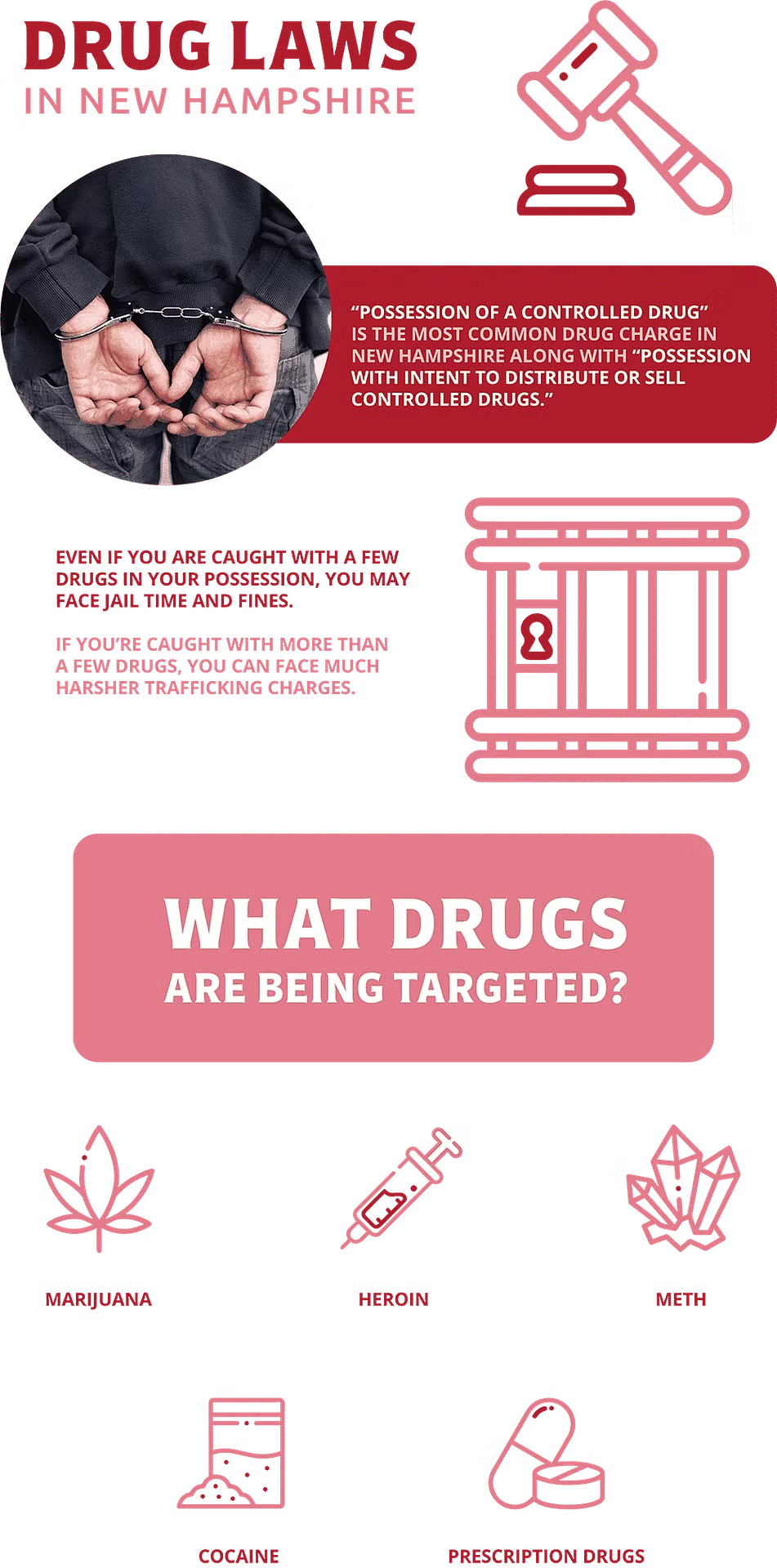New Hampshire Drug Rehab Resources
In 2015, more than 400 people in New Hampshire died from a drug overdose. That is 2 ½ times more than in 2011. Most of those overdoses were a result of opioid abuse. The opioid addiction crisis in New Hampshire crosses both social and economic levels and affects the life of every resident. That’s why New Hampshire drug rehab programs are necessary.
Home > Resources
Although the results of addiction can be devastating for individuals and their families, many people can and do recover. Individuals can improve their health and wellness, live self-directed lives, and reach their full potential. Live Free Recovery, which has two rehab centers in NH, can provide comprehensive addiction recovery services for a number of addictions.
Start Your Road to Recovery Now

Drug Use in New Hampshire
The National Survey on Drug Use and Health (NSDUH) provides state-level and national data on:

- The use of tobacco
- Alcohol
- Illicit drugs (includes the nonmedical use of prescription drugs), and
- Mental health
In its most recent survey, 12.15% of New Hampshire residents reported using illicit drugs in the past month. The average nationally was 8.82%. In addition, 4.65% of New Hampshire residents reported using an illicit drug other than marijuana in the past month while the national average was 3.6%.
Drug Trends in NH
- There were 417 drug overdose deaths in New Hampshire in 2020. There were 415 in 2019. Therefore, drug overdose deaths increased by less than 1% over that year.
- In 2020, the highest suspected drug use that resulted in overdose deaths per capita was Strafford County at 3.10 deaths per 10,000 in population.
- Hillsborough County was second with 2.90 deaths per 10,000 in population.
- Carroll, Coos, and Sullivan Counties stayed the same at 2.26, 1.80, and 1.59 overdose deaths per 10,000 population respectively.
- The age group with the largest number of overdose deaths in 2020 was 30 – 39-year-olds, at 32%.
Addiction Resource Center (ARC) Portal
This site is a good first step for those who are concerned with their substance use or those concerned about a loved one. The site includes a free assessment and educational information about addiction. Other resources include links to local AA, NA, SMART Recovery and Celebrate Recovery meetings in the user’s area.
Drug Laws in New Hampshire
“Possession of a controlled drug” is the most common drug charge in New Hampshire, along with “possession with intent to distribute or sell controlled drugs.” Except for the possession of small amounts of marijuana, these are considered felony charges.

Types of Drug Charges
As in the rest of the country, the prescription drug craze is sweeping through New Hampshire. With this, the authorities have cracked down on people who possess or sell these drugs. However, the drug epidemic has become so serious in New Hampshire that law enforcement, prosecutors, and judges are taking a hard line on individuals who are suspected of possession or accused of drug crimes.
In New Hampshire, a drug arrest can cause serious consequences. Of course, this depends on the situation surrounding your case. Even if you are caught with a small amount of drugs in your possession, you may face jail time and fines. And if you’re caught with a large amount of drugs, you can face much harsher trafficking charges.
Simply stated, law enforcement is on the lookout for drug suspects, prosecutors are standing by to bring charges, and judges are ready to “throw the book at you.” Keep this in mind if you are in possession of drugs in New Hampshire.

What Drugs are Being Targeted?
Possession of almost any illegal drug can send you to jail in New Hampshire. Some of the serious offenses listed in the state’s statutes include:
- Marijuana (more than ¾ of an ounce)
- Synthetic marijuana (spice)
- Heroin
- Methamphetamine
- Cocaine
- Crack cocaine
- Prescription drugs (including most opioid drugs)
Granite State Area Narcotics Anonymous
This website offers a list of area Narcotics Anonymous groups, including locations and meeting times. Virtual meetings and other online resources are also listed. There is an addict callback support line for those in crisis, as well as listings of area meetings and events. Other resources include videos and booklets about drug addiction, comprehensive descriptions of the 12 steps of recovery, and assistance for those seeking a sponsor.

What Are Opioids?
The term “opioids” refers to certain illegal drugs, such as heroin, and prescription medications used to relieve pain. Opioids are highly addictive. In fact, in New Hampshire and all across the U.S., there is an opioid crisis. Therefore New Hampshire residents that suffer from opioid addiction need to attend New Hampshire drug rehab. Opioids that are often a part of the opioid crisis include:
- Heroin
- Street fentanyl
- Other illicit opioids
- Misuse of prescription drugs

Consequences of Opioid Addiction
There are many consequences that comes with suffering from an opioid addiction, including:
- Overdose deaths
- Neglect of loved ones
- Self-neglect
- Homelessness
- Health effects
- HIV
- Hepatitis C
- Liver damage
- Heart problems

Response to the Opioid Crisis in New Hampshire
Responding to the opioid crisis, the DHHS (Department of Health and Human Services) has worked to develop and advance contracts with a range of substance abuse providers across the state. This is to help ensure a path to critical prevention, treatment, and recovery services. Since January 2016, DHHS has promoted this initiative and the governor and Executive Council have approved about $24 million in contracts for substance misuse, prevention, treatment, and recovery services.
Preventing Overdose
You can help someone who is risking an opioid overdose. If you use opioids or have family members or friends who do, you should have naloxone (Narcan) nearby and know how to use it. Here’s what to do:
- If you think someone has overdosed, call 911 first.
- Administer naloxone after calling 911. Naloxone temporarily reverses the effects of an opioid overdose. This can save the life of someone who uses heroin, fentanyl, and other synthetic opioids, including prescription opioid medication.
- Naloxone is harmless if the person has not overdosed on opioids.
Overdose Symptoms
- The person is unresponsive and can’t wake up
- Body is limp
- Blue/dark purple appearance
- Slow or stopped breathing
- Slow or stopped pulse
- Snore-like gurgling sound
- Pinpoint pupils
In 2020 in NH, the age group with the highest number of Narcan administrations by the EMS was 30-39. This represented 31.2% of all incidents that year. Also in 2020, Strafford County had the highest number of Narcan incidents with 15.44 per 10,000 people. And Coos County was the only county to have an increase in EMS Narcan use.

Drug and Alcohol Rehab Resources in New Hampshire
In these trying times, many people struggle with addiction to drugs or alcohol. Finding resources to help those in need find support, detox in a healthy manner and get the help and education they need about drug and alcohol addiction can be challenging. We’ve put together a guide to the top Drug and Alcohol Resources in New Hampshire.

Live Free New Hampshire Drug Rehab
Live Free Recovery Services has two locations in the state to offer you or your loved one a recovery program designed to specifically address your needs. We don’t believe you can address individual goals with a “one-size fits most” service. That’s why we provide a number of treatment programs, therapy, counseling, and aftercare services, along with the following:
Treatment Programs at Our Rehab Centers in NH
Intensive Outpatient Program (IOP)
In an intensive outpatient program, you’ll attend the rehab center 3 or 4 days a week for about 4 hours per day. It’s less intensive than a PHP but has a higher level of care than a regular outpatient program.
IOPs are good for people who have a mild to moderate addiction of a shorter duration. Your initial evaluation will determine whether IOP is a good starting point for you. Many people use the IOP rehab option as a step down from PHP treatment. The longer you continue in some level of treatment, the better your chances of lifelong recovery.
Outpatient Program (OP)
OPs are not recommended for people who have a severe addiction that has interfered with their lives and/or careers. However, if you have completed a more intensive program and have a stable home environment, an outpatient program may be right for you. The flexibility of hours and attendance at OPs make them perfect for continuing treatment or for a person who has a low drug or alcohol dependence.
Sober Living
People in sober living homes have the chance to adjust to living drug-free lives without the close supervision or structure that other rehab programs have. In a sober living program, you may attend an outpatient program at the rehab if you don’t have a stable home environment, making this a de facto lower intensity residential program.
Residents in sober living may continue to receive their medication-assisted treatments that were established in outpatient treatment. Sober living residents will also continue to meet with counselors to ensure that their recovery is still on track. Frequently, attendance at 12-step meetings or other support groups is required at sober living facilities. And because New Hampshire has many beautiful outdoor areas, there are also often recreational activities offered at sober living homes in New Hampshire such as hiking, skiing, and camping.
SMART Recovery
SMART Recovery is a science-based recovery system that helps individuals who struggle with drug or alcohol addiction. Resources include webinars and podcasts to help addicts learn more about the nature of addiction. Virtual meetings are regularly scheduled as are group therapy sessions. SMART Recovery also has a mobile app with check-up choices and tips for safe recovery.
Naloxone Kits in New Hampshire
Naloxone kits may be purchased at a pharmacy that is operating with a standing order (universal prescription) for those seeking safe detox and recovery from opiate addiction. Naloxone kits are available for free from recovery community organizations (RCO), or from the local regional Doorway, one of nine “hubs” that support those who need drug and alcohol addiction support. Naloxone can help the severity of withdrawal and the side effects of detoxing. The site also has a map of pharmacies with these kits available.
Start Your Journey and Live Free
You can live a fulfilling life free of the struggle of drug or alcohol addiction. You can be free of the shame, embarrassment, and guilt. We know that the stigma of addiction is real, but you need to take the first step to get better. We’ll take it from there. Make the first move and contact us today to receive New Hampshire drug rehab.
Additional Resources:
References:
Did this article answer your questions?
"*" indicates required fields
Take the First Step Towards a Brighter Tomorrow
At Live Free Recovery, we’re committed to walking alongside you on every step of your journey. Our compassionate team is here to provide the guidance and support you need to overcome addiction and reclaim your life. Don’t wait—reach out today to speak with someone who truly understands your struggles and can help you take that important first step toward healing and a fresh start.
Your path to recovery starts here.
